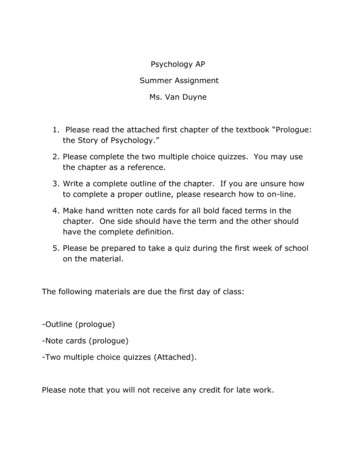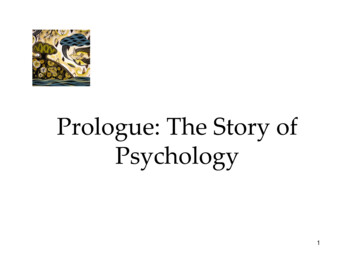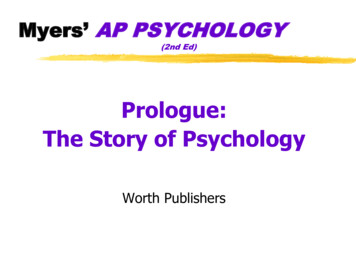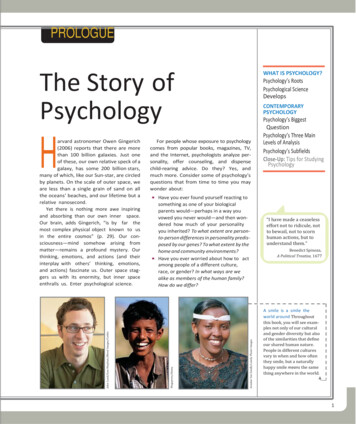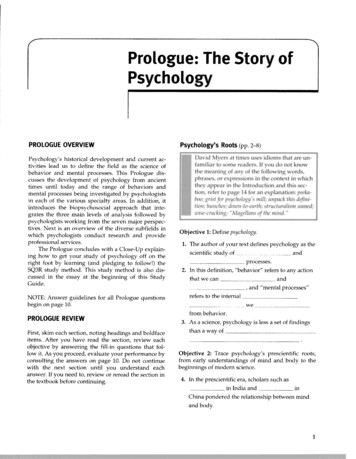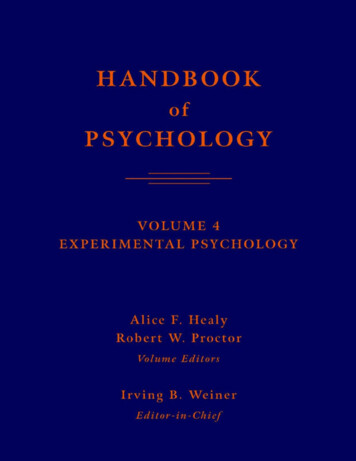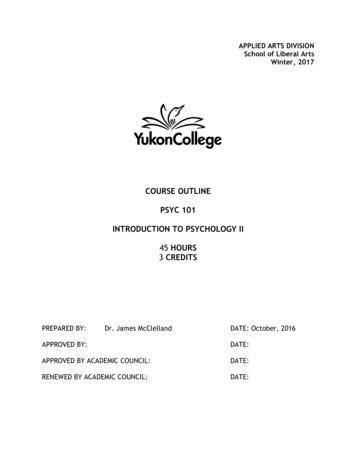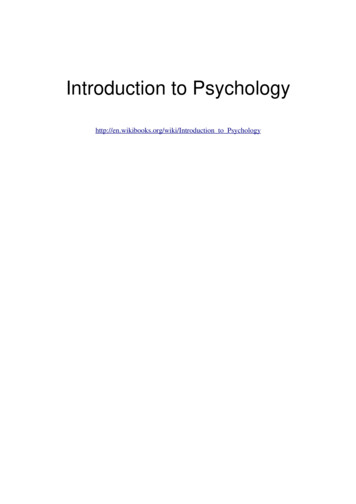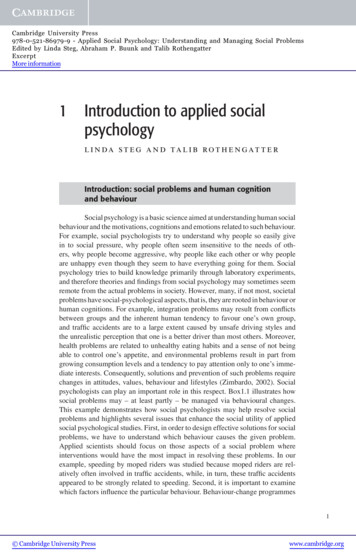
Transcription
AP PSYCHOLOGYIntroduction:The Story of PsychologyAdapted from James A. McCubbin, PhDClemson University
Psychology has Greek rootsPsych[e] means “mind” and is separate& distinct from the physical body.ology is a field of study, the “study ofthe mind”
What is Psychology? Psychology is a science that seeks to answerquestions about: how we think feel and act. The goals of psychology are to observe,predictand control or modify behavior and/or mentalprocesses. Definition: The scientific study of behavior &mental processes.
PSYCHOLOGY TODAYWe define psychologytoday as the scientificstudy of behavior(what we do) andmental processes(inner thoughts andfeelings).4
PsychologyWhat is it?The study of our inner feelings and behaviors.Do our feelings always match our behaviors?If you call me dumb,I may feel sad inside.But I willstill acttough.
What is behavior?-Anything an organism does any action that wecan observe & record. (what you see a persondo)What do we mean by mental processes?-the internal subjective experiences we inferfrom behavior, sensations, perceptions,emotions, dreams, thoughts & beliefs.
History of Psychology Although the science of psychology started in thelate 1800’s, the concept has been around a lotlonger. There was evidence of trephination (cutting holesinto a skull to let evil spirits out) back in the stoneage.
Psychology’s RootsPrescientific Psychology Is the mind connectedto the body or distinct? Are ideas inborn or isthe mind a blank slatefilled by experience?
Prescientific aw.umkc.eduSocratesSocrates (469-399 B.C.) and Plato (428-348 B.C.)Socrates and his student Plato believed the mindwas separate from the body, the mind continued toexist after death, and ideas were innate.9
Prescientific PsychologyRene Descartes omDescartes, like Plato, believed in soul (mind)-bodyseparation, but wondered how the immaterialmind and physical body communicated.10
Prologue:Psychology’s Roots
Psychology’s Roots Wilhelm Wundtopened the firstpsychologylaboratory at theUniversity ofLiepzig, Germany(c.Dec. 1879)
Psychology’s FirstExperimentHe created an experimental apparatusthat was used to measure the time lagbetween a person hearing a ball hit aplatform and their pressing a telegraphkey.Wundt was seeking to measure the“atoms of the mind”
Key People in the Originof Psychology Wilhelm Wundt”Father ofPsychology”Structuralism usedintrospection(looking in) toexplore theelemental structureof the human mind
Prologue:Psychology’s Roots Psychological Science Is Born Empiricism Knowledge comes from experience viathe senses Science flourishes through observationand experiment
Key People in the Origin ofPsychologyEdward Titchner: (1867-1927)A student of WundtCreated Structuralism
William James1842-1910 Functionalismfocused on howbehavioralprocessesfunction- howthey enableorganism toadapt, survive,and flourish
William James1842-1910First American psychologistAuthor of first psychology textbook in1890, called Principles of PsychologyHarvard University philosopher &psychologistCreated Functionalism
G. Stanley Hall 1844-1924Receives from Harvard, the first PHD inpsychologyEstablished the first Psych lab in the U.S.at John Hopkins UniversityFounded in 1892 the APA and was thefirst president.Student of Wundt
Mary Whiton Calkins1863-1930Student of James1905-was first female president of APAHarvard refused her PHD degree inPsychology, offered it from RadcliffeDid research in dreams, memory &personality.
Margaret Floy Washburn1871-1939-First woman to get a PHD in psychologyfrom Cornell University.-Student of Titchner-Second female president of the APA in1921
Sigmund Freud 1856-1939Founded PsychoanalysisSchool of thought that focused on howbehavior & our problems are a result ofunresolved childhood conflicts of whichwe are unaware of.Also a form of treatment for abnormalbehavior.
Ivan PavlovBehavioristDiscovered Classical Conditioning ( a typeof learning. Learning by association)
John WatsonFounded Behaviorism-which is a schoolof thought that focuses on how we learnby studying only observable responses.Psychology should only study what can beobserved & measured scientifically.
B. F. SkinnerBehavioristDeveloped Operant Conditioning
Abraham Maslow 1908-1970andCarl Rogers 1902-1987Founded Humanism a school of thoughtthat focuses on the study of the consciousexperience, the individual’s right of choiceand capacity for personal growth.People strive to reach their potential or“self-actualization”.
Prologue:Psychology’s Roots Psychological Science Develops Wundt--German philosopher andphysiologist James--American philosopher Pavlov--Russian physiologist Freud--Austrian physician Piaget--Swiss biologist
Psychology’s Three Main Levelsof Analysis Levels of tural Biopsychosocial Approach
Psychology’s Three Main Levels ofAnalysis
Psychology’s Three Main Levels ofAnalysis
Psychology’s Three Main Levels ofAnalysis
Psychology’s Three Main Levels ofAnalysis
Waves of PsychologyThe science of psychology has gonethrough about 5 different waves sinceit started.Waves are different ways of thinkingover time.
Wave One: Introspection Started with William Wundt’s firstpsychological laboratory and hisconcept of introspection(structuralism). Then William James wrote ThePrinciples of Psychology anddiscussed functionalism. In reality these ideas do not havemuch impact on how psychologiststhink today.
Wave Two: Gestalt PsychologyLed by Max Wertheimer, these guys focusednot on how we feel, but on how we experiencethe world.The whole of an experience can be more thanthe sum of its parts.This may seem likeone picture, but it canbe perceived as 2different faces. Canyou find them?
Gestalt PsychologyFounded by Max Wertheimer as a revolt againstWundt.Gestalt is a German word that means: whole orconfiguration. Instead of analyzing the elementsof consciousness, you must study the individualelements of the entire experience togetherwhich creates something new & different.“The whole is different from the sum of itsparts.”Perception, insight & problem-solving.Movement died during Nazi Germany in 1930’s.
Wave Three: PsychoanalysisThis wave of thinking started withSigmund Freud (in the early 1900’s).During this time period people believedthat most of your feelings come from ahidden place in your mind called theunconscious.We protect ourselves from our realfeeling by using defense mechanisms.
Wave Four: Behaviorism During this time period (early to mid 1900s), peoplestarted to ignore how you feel inside. All that mattered was how you acted. If you they could change your behavior, who careshow you feel. Very popular during the conservative 1950’s whensocial appearance mattered more than selfexpression.
Wave Five: Eclectic We are now in wave five .which is aboutvariety. Psychologists pick and choose whattheories to use depending on the situationand the client.
Wave Five is made up of about 7different perspectives.In other words, psychologists today, pickand choose from about 7 schools ofthought to help you with your problems.
Biologial (Neuroscience)PerspectiveAll of your feelings and behaviorshave an organic root.In other words, they come fromyour brain, body chemistry,neurotransmitters, etc Let us imagine for a second that your dog died(sad but it will happen). You becomedepressed. You stop eating and sleeping.What would a psychologist from this school sayis going on and how might they help you?
Evolutionary PerspectiveFocuses on Darwinism.We behave the way wedo because we inheritedthose behaviors.Thus, those behaviorsmust have helped ensureour ancestors survival.How could this behavior ensure Homer’sancestors survival?
Psychoanalytic Perspective Focuses on theunconscious mind. We repress manyof our truefeelings and arenot aware of them. In order to getbetter, we mustbring forward thetrue feelings wehave in ourunconscious.If a man hasintimacy issuesand cannot formrelationshipswith others.What do youthink someonefrom this schoolmay think?Perhaps they maydelve into the man’sunconscious anddiscover that he wasbullied when he wasyounger. The bullyingmay have caused fearin getting close toothers.
Behavioral PerspectivePretend that youfail psychologyclass. You becomedepressed. In turn,you begin to bingeand gain weight. Focuses on observablebehaviors whileputting feelings tothe side. We behave in waysWhat do you think abecause we have beenbehaviorist may do?conditioned to do so.They would probably ignore To change behaviors,the fact that you aredepressed and just focus onwe have toyour overeating.recondition the client.
Humanist Perspective Peaked in the late1960’s and 70’s .so itfocused on spiritualityand free will. We have to strive tobe the best we can be“self-actualization”. Happiness is definedby the distancebetween our “selfconcept” and “idealself”.
Cognitive Perspective Focuses on how wethink (or encodeinformation) How do we see theworld? How did we learn toreact to sad or happyevents? Cognitive Therapistattempt to change theway you think.You’re rejected!You meet someone Hopes are high!!!How do you react to the rejection?Some learn to get backon the horse and tryagain.Some learn to giveup and live a lonelylife of solitude.
Social-Cultural Perspective Says that much of yourbehavior and yourfeelings are dictated bythe culture you live in. Some cultures kiss eachother when greeting,some just bow. Does your culture placevalue on individual orthe group?
Psychology’s Three Big DebatesNature Versus NurtureStability VersusChangeContinuity VersusDiscontinuity
Psychology’s Big IssuesNature-nurture controversy the relative contribution thatgenes and experience make todevelopment of psychologicaltraits and behaviors
Psychology’s Big IssuesStability vs. Change - do our traitschange as we age or do we stay thesame?Rationality vs. Irrationality –whatcauses our minds to error?
Psychology’s Subfields Basic Research Biological psychologists explore thelinks between brain and mind Developmental psychologists studychanging abilities from womb to tomb Cognitive psychologists study how weperceive, think, and solve problems Increase scientific knowledge base.
Psychology’s Subfields Basic Research continued Personality psychologists investigateour persistent traits Social psychologists explore how weview and affect one another
Psychology’s SubfieldsApplied Research Industrial/organizational psychologistsstudy and advise on behavior in theworkplace Scientific study to solve practicalproblems Clinical psychologists study, assess,and treat people with psychologicaldisorders
Psychology’s Subfields Psychiatry A branch of medicine dealing withpsychological disorders Practiced by physicians who sometimesuse medical (for example, drug)treatments as well as psychotherapy
Introduction: The Story of Psychology. AP PSYCHOLOGY. Introduction: The Story of Psychology. Adapted from James A. McCubbin, PhD Clemson University. Psychology has Greek roots. Psych[e] means “mind” and is separate & distinct from the physical body. ology is a
